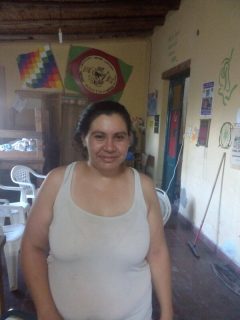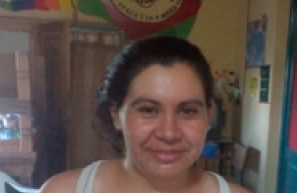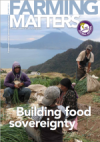Belén Arenas makes the case for an education that supports peasant youth to continue working on the land while maintaining their culture and dignity.

I was born in Los Leones, a small community in the province of Mendoza, Argentina, about 300 km from Mendoza’s capital. The 15 families that form our community have lived there for generations. We raise goats, sheep, cows and horses, make cheese and produce fruits and vegetables. We do all the work ourselves and we share our land communally. Our production is for self-consumption and to sell in local markets at a fair price. For us, this is food sovereignty.
We used to live a quiet life, but in late 2006 some businessmen showed up bearing forged property titles and saying they owned our land. They had an eviction order for our animals, and a machine with which they intended to loot the fields that sustained our lives. Those were difficult moments. Where peace once reigned, everything seemed to crumble down. After asking for help in various places, the National Movement of Indigenous Peasants of Argentina informed us about our right to our lands and territories. They helped us to organise ourselves, and to resist. We joined the Union of Landless Rural Workers of Mendoza (UST) and we managed to free the land from the barbed wire fences and won the court cases.
In 2010, we started to visit other organised communities. As a movement of landless workers, we realised that we needed a school that would prepare us for resistance in the countryside. The school I went to, for example, was 60 km away from our community. Students live there and only return home two or three times a year. Most young people of Los Leones only finished primary school, and those who completed their secondary education never went back to work on the fields.
Some communities didn’t want a school. They said, “What do you want a school for? Schools are only good for taking people off of the land.” This made us think about the type of school we wanted and to consider the kind of education our students needed.
We started our first school in 2011. We alternated one week of lesson attendance per month with three weeks back in our communities. Being back at our communities allowed us to continue with our tasks and helped to prevent uprooting, because both the family and the community were also part of the school.
We teach what we know because we want education to be a tool that gives us a voice in the conflicts that affect us. We want an education that helps us to generate our own livelihoods. We want our youth to have the right to work on the land, to maintain our culture and live a dignified life.
Belén Arenas (belenarenas213@gmail.com) is a young peasant from the department of San Rafael in the south of the province of Mendoza, Argentina. She is a member of the Union of Landless Rural Workers of Mendoza and the National Movement of Indigenous Peasants of Argentina.


